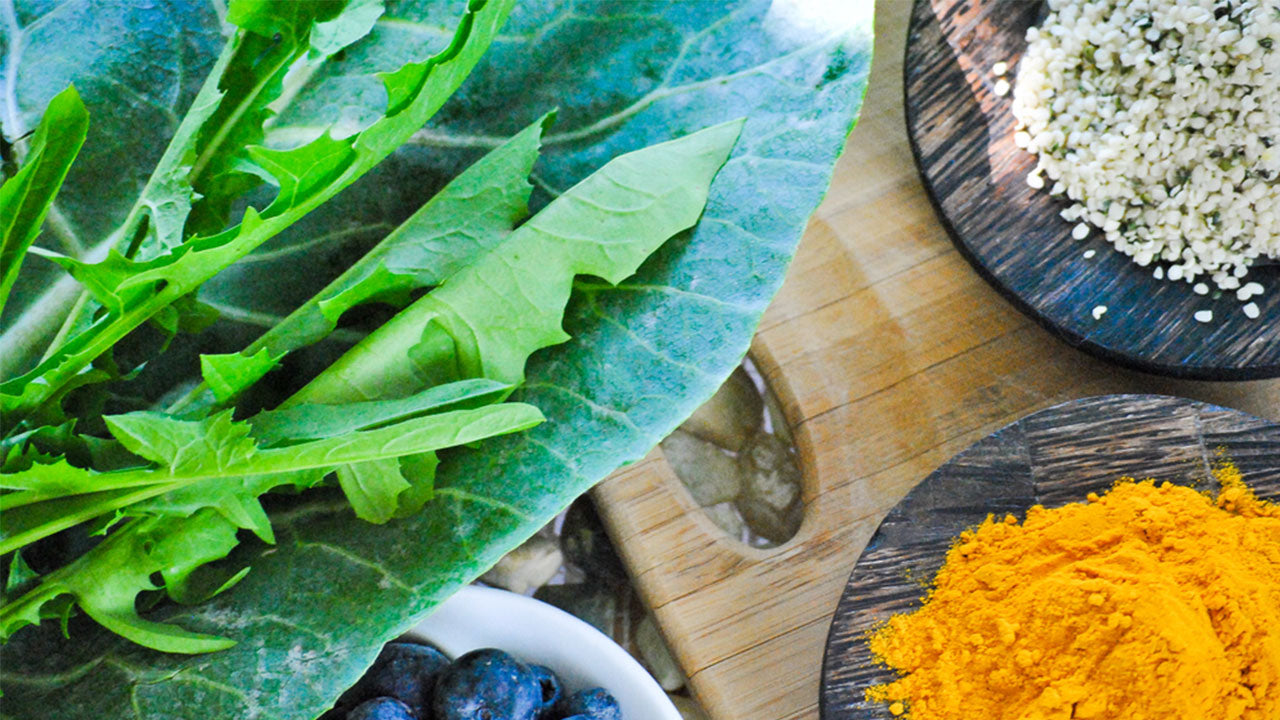The Best Anti-Inflammatory Foods Everyone Should Be Eating
 By: by Amino Science
By: by Amino Science

Chances are, you've come across the term before: anti-inflammatory foods. You have a general sense that it's important to include these foods in your diet, and you may even be able to name a few, like fatty fish and leafy greens. You may also have questions: like why exactly it's important to combat inflammation and what the best anti-inflammatory foods to do so might be. Read on to find out.
What Is Inflammation?
Inflammation is the body’s natural response to a threat. When our immune system recognizes a threat, such as a microbe or a virus, it responds by releasing specialized defenses to neutralize that threat.
Inflammation forms a crucial component of the immune system's defenses. Our body uses inflammation to heal itself and defend against invaders—a process that often involves some redness and swelling. If you sprain your ankle, for example, the surrounding area will swell and become inflamed while your body works to heal that injury. Short-term inflammation triggered by an injury or infection comprises an important part of the body's healing process. But long-term, recurrent, persistent chronic inflammation? That's an entirely different beast.
Chronic inflammation does not result from an injury or infection, but rather as the result of ongoing influences such as a lack of sleep, high levels of stress, or a poor diet. Unlike beneficial, healing, short-term inflammation, this type arises even when you're not under direct threat from a foreign invader.
Chronic inflammation can be seen as an immune system dysfunction. In essence, the body sends a response to a threat that is perceived but that does not require an inflammatory response. The immune system then kicks into overdrive and won’t turn off. This can occur due to chronic conditions such as osteoarthritis, or due to an inability to distinguish between real and perceived threats.
The Effects of Chronic Inflammation
When left unaddressed for too long, chronic inflammation can trigger a multitude of disease processes. This makes it fertile territory for many researchers who hope to better comprehend its mechanisms and foster methods for counteracting it.
Scientists are still working to understand all the effects of chronic inflammation, but it is clear that it has been linked to a host of diseases, including heart disease, diabetes, bone loss, depression, aggressive behavior, rheumatoid arthritis, and even cancer. All these conditions can be affected by lifestyle and environmental factors, such as:
- Excess weight
- Poor diet
- Lack of exercise
- Stress
- Smoking
- Pollution
- Poor oral health
- Excessive alcohol consumption
Chronic inflammation is, in essence, a prolonged state of emergency. The continued presence of inflammatory cells in the blood vessels leads to the buildup of plaque in the arteries, which causes the walls of the arteries to thicken and harden. This, in turn, substantially increases your risk of cardiovascular disease, heart attack, and stroke.
Inflammation plays a significant role in the progression of Alzheimer's disease as well. Scientists have now proved unequivocally that inflammatory compounds can cross the blood-brain barrier, but have yet to identify exactly how they contribute to the development of Alzheimer's and other conditions that adversely impact the health of the brain.
While elevated inflammatory markers unquestionably have an adverse impact on your health, the good news is that we have the ability to influence a number of factors that lead to chronic inflammation and inflammatory diseases.
One of the most effective ways to fight chronically high levels of inflammation is through our diets. “Many experimental studies have shown that components of foods or beverages may have anti-inflammatory effects,” says Dr. Frank Hu, professor of nutrition and epidemiology in the Department of Nutrition at the Harvard School of Public Health.
25 of the Best Anti-Inflammatory Foods to Add to Your Diet
When health experts suggest adopting a proven anti-inflammatory diet, such as the Mediterranean diet, the primary goal of such an approach is to alleviate the negative outcomes experienced by individuals suffering from chronic inflammation. That said, everyone can benefit from eating more anti-inflammatory nutrients.
These 25 powerful anti-inflammatory foods can help protect against certain diseases and slow the aging process, stabilize blood sugar, increase metabolism, and even lower your cancer risk.

To facilitate a concise and comprehensible overview of the ways certain foods with potent inflammation-quelling effects improve your health, we've divided them into four general categories:
- Vegetables and fruits
- Healthy fats
- Fiber-filled foods
- Herbs, spices, and more
Foods from these four categories provide crucial nutrients, such as omega-3 fatty acids, vitamin B6, magnesium, zinc, niacin, and vitamin C that benefit your health on many levels.
1. Vegetables and Fruits
It's no coincidence that just about every expert out there recommends vegetables and fruits as the basis of a healthy lifestyle. Loading up on these foods can help to combat weight gain, safeguard your heart health, prevent metabolic syndrome, and more.
In addition to common healthy eating favorites such as leafy greens and vitamin-C loaded oranges, make sure to incorporate plenty of cruciferous vegetables and alliums into your diet.
Cruciferous vegetables—a family that includes broccoli, cabbage, cauliflower, mustard greens, and Brussels sprouts—and alliums—such as garlic, scallions, onions, and leek—have antioxidant properties and have been shown to lower the risk of cancer. If you like garlic, eating one clove per day is ideal—it might add an extra punch to your favorite meals.
2. Healthy Fats
While popular opinion used to demonize fats, the truth is that far from undermining your health, they can dramatically improve it.
Plus, adding fat to your food enhances its flavor.
Oil is an essential ingredient in the kitchen and offers the opportunity to select a type of fat that brings health benefits, such as extra-virgin olive oil. Olive oil lowers the risk of heart disease by helping to reduce cholesterol levels.
A special place in your diet should go to avocados, which contain omega-3 fatty acids and have been shown to have antioxidant properties. A 2013 study in the journal Food & Function found that people who ate a hamburger with avocado had lower levels of a kind of inflammatory marker called CRP (C-reactive protein) 4 hours after eating than those who did not.
Prioritizing healthy fats should impact your selection of proteins too. Research shows that omega-3 fatty acids reduce inflammation and may help lower risk of chronic diseases. Cold-water fish, such as salmon, herring, tuna, trout, and mackerel, are among the best sources of omega-3 fatty acids. Other foods high in omega-3 fatty acids include beans (navy, kidney, and soy), flax seeds, and walnuts.
Many foods rich in omega-3 fatty acids, like cold-water fish and beans, are also excellent sources of amino acids, which have strong inflammation-fighting effects of their own. A diet that includes omega-3 fatty acids and protein lowers the risk of chronic diseases and enhances muscle growth and strength.
3. Fiber-Filled Foods
In addition to many vegetables, like okra, eggplant, and onions, and a variety of fruits like bananas and blueberries, the best sources of fiber include whole grains such as brown rice, barley, and oatmeal.
The fiber in whole grains mediates inflammatory processes by helping with weight loss and feeding beneficial gut bacteria, according to the Arthritis Foundation.
4. Herbs, Spices, and More
When cooking vegetables, consider adding spices like ginger, rosemary, turmeric, oregano, cayenne, cloves, and nutmeg, which have anti-inflammatory compounds. These spices add kick to your meal and are also good for your health.
Extensive research also shows that green tea and dark chocolate (in part due to its magnesium content) can lower inflammation levels.
Can Foods Cause Inflammation?
It’s important to introduce healthy foods into your diet to fight chronic inflammation, but it’s also critical to avoid certain foods.
It can be all too easy to inadvertently eat a pro-inflammatory diet by overdoing it on refined carbohydrates like white bread and pastries, fried foods, soda and all the sugar-sweetened beverages, and processed meat such as hot dogs.
Most foods that contribute to inflammation are generally foods you should eliminate from your diet or consume in moderation, as they are linked to chronic diseases such as type 2 diabetes and heart disease.
Processed foods contain trans fats, which have higher levels of C-reactive protein, a cause of inflammation. It’s essential to read labels when you go grocery shopping—in 2006, the FDA required food manufacturers to identify trans fats on nutrition labels, so taking time to read the ingredients contained in the food you buy is crucial.
How to Build an Anti-Inflammatory Diet
A healthy, anti-inflammatory diet includes several servings of foods high in amino acids and omega-3 fatty acids each week, fiber every day, and plenty of fruits and vegetables. Heal is an amino acid supplement proven to help maintain a healthy inflammation response, and is especially helpful when taken in times of stress, illness, or injury.
You should also limit the consumption of saturated fat to 10% of your daily calories.
One way to help meet these goals is to snack strategically. You can add a few servings of healthy foods like berries or walnuts, and the powerful anti-inflammatory compounds they contain will stack up quickly.
If your meals need extra sweetness, try adding naturally sweet fruits rather than sugar. You may find that working in spices that are known for their anti-inflammatory properties to add flavor will have the added bonus of not necessitating as much added sweetness as you're accustomed to.
There's no one perfect anti-inflammatory diet, and it's vital that you consider your own preferences as well as what scientists have discovered about certain foods. The most effective way to use foods to improve your health is not to adopt a short-term strategy like a cleanse but rather to make sustainable changes to your long-term interactions with food.

Up to 25% off Amino
Shop NowTAGS: food
Join the Community
Comments (0)
Most Craveable Recipes




 833-264-6620
833-264-6620



















